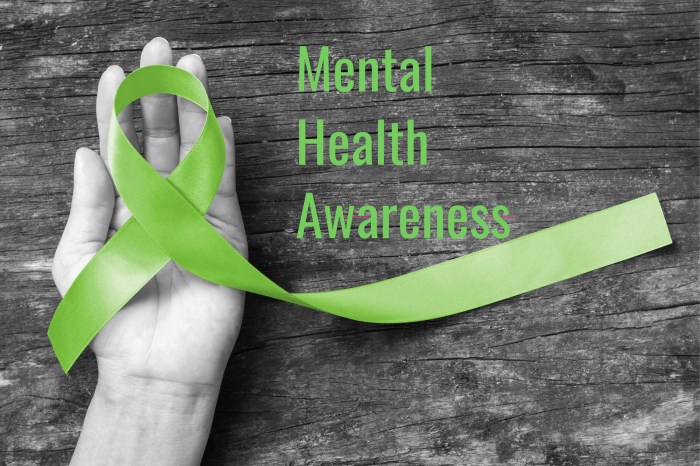Mental Health Awareness takes center stage, inviting you into a world where understanding is key. Get ready to dive into the importance of spreading awareness and breaking the stigma surrounding mental health.
From common disorders to self-care practices, this topic is crucial for everyone’s well-being.
Overview of Mental Health Awareness

Mental health awareness involves educating individuals about various mental health conditions, reducing stigma surrounding mental illness, and promoting resources for mental health support. It aims to increase understanding and empathy towards those struggling with mental health issues.
Examples of Campaigns and Initiatives
- The “It’s Okay to Not Be Okay” campaign, which encourages open conversations about mental health and seeks to normalize seeking help.
- The “Bell Let’s Talk” initiative, which uses social media to raise funds for mental health programs and encourages dialogue about mental health.
- The “You Are Not Alone” movement, which focuses on providing support and resources for individuals experiencing mental health challenges.
Importance of Spreading Awareness
Spreading awareness about mental health is crucial in breaking down stereotypes and ensuring individuals feel comfortable seeking help when needed. By promoting understanding and empathy, we can create a more supportive and inclusive environment for those facing mental health struggles.
Common Mental Health Disorders

It is crucial to be aware of common mental health disorders as they can significantly impact individuals’ lives.
Anxiety Disorders
Anxiety disorders are characterized by excessive worry, fear, or nervousness that can interfere with daily activities. Symptoms may include panic attacks, obsessive thoughts, and avoidance behavior.
Depression
Depression is a mood disorder that causes a persistent feeling of sadness and loss of interest in activities. It can lead to various physical and emotional symptoms such as fatigue, changes in appetite, and thoughts of suicide.
Bipolar Disorder
Bipolar disorder involves extreme mood swings that include emotional highs (mania or hypomania) and lows (depression). Individuals with bipolar disorder may experience changes in energy levels, sleep patterns, and behavior.
Schizophrenia
Schizophrenia is a severe mental disorder that affects a person’s ability to think, feel, and behave clearly. Symptoms may include hallucinations, delusions, disorganized thinking, and social withdrawal.
Obsessive-Compulsive Disorder (OCD)
OCD is characterized by intrusive thoughts (obsessions) and repetitive behaviors (compulsions) that individuals feel compelled to perform. Symptoms can interfere with daily life and cause significant distress.
Stigma Surrounding Mental Health
Stigma in the context of mental health refers to the negative attitudes, beliefs, and misconceptions that society holds towards individuals with mental health conditions.
When it comes to seeking help for mental health issues, stigma can have a significant impact. Many individuals may feel ashamed or fear judgment from others, leading them to avoid seeking the necessary support and treatment they need.
Impact of Stigma
Stigma can prevent individuals from opening up about their struggles, leading to feelings of isolation and loneliness. It can also hinder access to quality mental health care and support services, further exacerbating the individual’s condition.
Strategies to Reduce Stigma
- Educating the public about mental health: By increasing awareness and understanding of mental health conditions, we can combat misconceptions and reduce stigma.
- Encouraging open conversations: Creating safe spaces for individuals to share their experiences can help normalize discussions around mental health and reduce stigma.
- Challenging stereotypes: Addressing and debunking common myths and stereotypes about mental health can help shift societal attitudes towards a more accepting and supportive stance.
- Supporting individuals: Providing empathy, support, and encouragement to those struggling with mental health challenges can help reduce the feelings of shame and isolation associated with stigma.
Self-Care Practices for Mental Health
Self-care is essential for maintaining good mental health. It involves taking care of yourself physically, emotionally, and mentally to ensure overall well-being. By incorporating self-care practices into your daily routine, you can effectively manage stress, reduce anxiety, and improve your mental health.
Establishing a Routine, Mental Health Awareness
Creating a daily routine can help provide structure and stability, which is crucial for mental well-being. Make sure to include activities that bring you joy and relaxation, such as exercise, meditation, or spending time with loved ones.
Physical Well-being
Taking care of your physical health is directly linked to your mental health. Ensure you get enough sleep, eat a balanced diet, and engage in regular physical activity. These practices can boost your mood and energy levels, contributing to better mental health.
Mindfulness and Relaxation Techniques
Practicing mindfulness and relaxation techniques, such as deep breathing exercises, yoga, or tai chi, can help reduce stress and promote emotional well-being. These techniques enable you to stay present in the moment and manage overwhelming thoughts or emotions.
Setting Boundaries
Establishing boundaries in your relationships and commitments is crucial for maintaining good mental health. Learn to say no when you feel overwhelmed, prioritize your needs, and communicate openly with others about your boundaries. This self-care practice can prevent burnout and promote healthy relationships.
Engaging in Hobbies and Creative Outlets
Participating in activities you enjoy, whether it’s painting, playing music, or gardening, can be therapeutic and uplifting for your mental health. Engaging in hobbies and creative outlets allows you to express yourself, reduce stress, and cultivate a sense of fulfillment.
